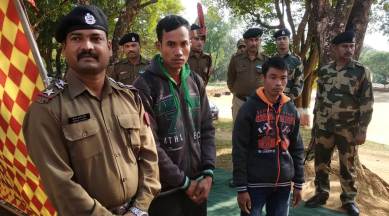Two cadres of banned NLFT insurgent outfit surrender in Tripura
Officiating BSF Inspector General (IG) Ashok Kumar Yadav informed that self-styled private sepoy Sanjoy Tripura alias Sudhanya, 43, surrendered with his assistant Hiranjoy Tripura alias Lambu Monday.

Two wanted cadres of outlawed National Liberation Front of Tripura’s (NLFT) Biswamohan Debbarma faction surrendered without arms before Border Security Force (BSF) in Tripura on Monday.
Speaking to reporters after a surrender ceremony at BSF sector headquarters at Shalbagaan, 10 Km from Agartala this morning, officiating BSF Inspector General (IG) Ashok Kumar Yadav informed that self-styled private sepoy Sanjoy Tripura alias Sudhanya, 43, surrendered with his assistant Hiranjoy Tripura alias Lambu today.
monthly limit of free stories.
with an Express account.
“The duo has surrendered due to constant efforts of BSF to convince insurgents in returning to mainstream life. Thirteen insurgents surrendered before us in 2018 and five more in the previous year,” the BSF official said.
NLFT was formed on March 12, 1989 with Dhananjoy Reang as its self-styled chairman. Reang was later expelled from NLFT in 1993 and Nayanbasi Jamatia became leader of the faction. In another split in 2001, a faction led by one Biswamohan Debbarma emerged, which is now the main active wing of the outfit. NLFT was outlawed in 1997 under the Unlawful Activities (Prevention) Act and later under the Prevention of Terrorism Act (POTA).
Sanjoy Tripura joined NLFT’s Biswamohan (BM) faction in 2000 and underwent cadre training in 2002. He was listed in a group of wanted insurgents by Special Branch in 2017.
His assistant Hiranjoy Tripura joined the outfit last year and was mainly used for administrative activities. Their surrender was engineered by BSF’s G-branch or intelligence officials at Ambassa in Dhalai district.
Officiating IG Yadav also said that NE insurgents in Bangladesh are “on the run” due to ‘zero tolerance’ policy of the Peoples Republic of Bangladesh led by Prime Minister Sheikh Hasina.
“We are always on alert. But Bangladesh government has also shown them zero tolerance which is why they are ‘on the run’ or acting as sleeper cells. There are 50-60 NLFT cadres acting as sleeper cells in Bangladesh. Most of them are in Khagrachari and Chittagong areas”, Yadav said.
Meanwhile, BSF is on the alert along the international border in Tripura, ahead of the upcoming Bangladesh Parliament elections.
“We want to make sure that there is no law and order problem due to cross-border movement. As the elections draw nearer, we shall put all our border areas on special alert,” Yadav said.
Tribal armed insurgency swelled between 1980 and late 2000s in Tripura, in the hands of Tripura National Volunteers (TNV), which surrendered in 1988. Insurgency largely came down during the erstwhile Manik Sarkar government owing to lucrative offers including Rs 1.5 lakh immediate grant, vocational training for 36 months and a stipend of Rs 2000 per month during training. Minor crime cases against those who were successfully rehabilitated were also assured to be withdrawn.